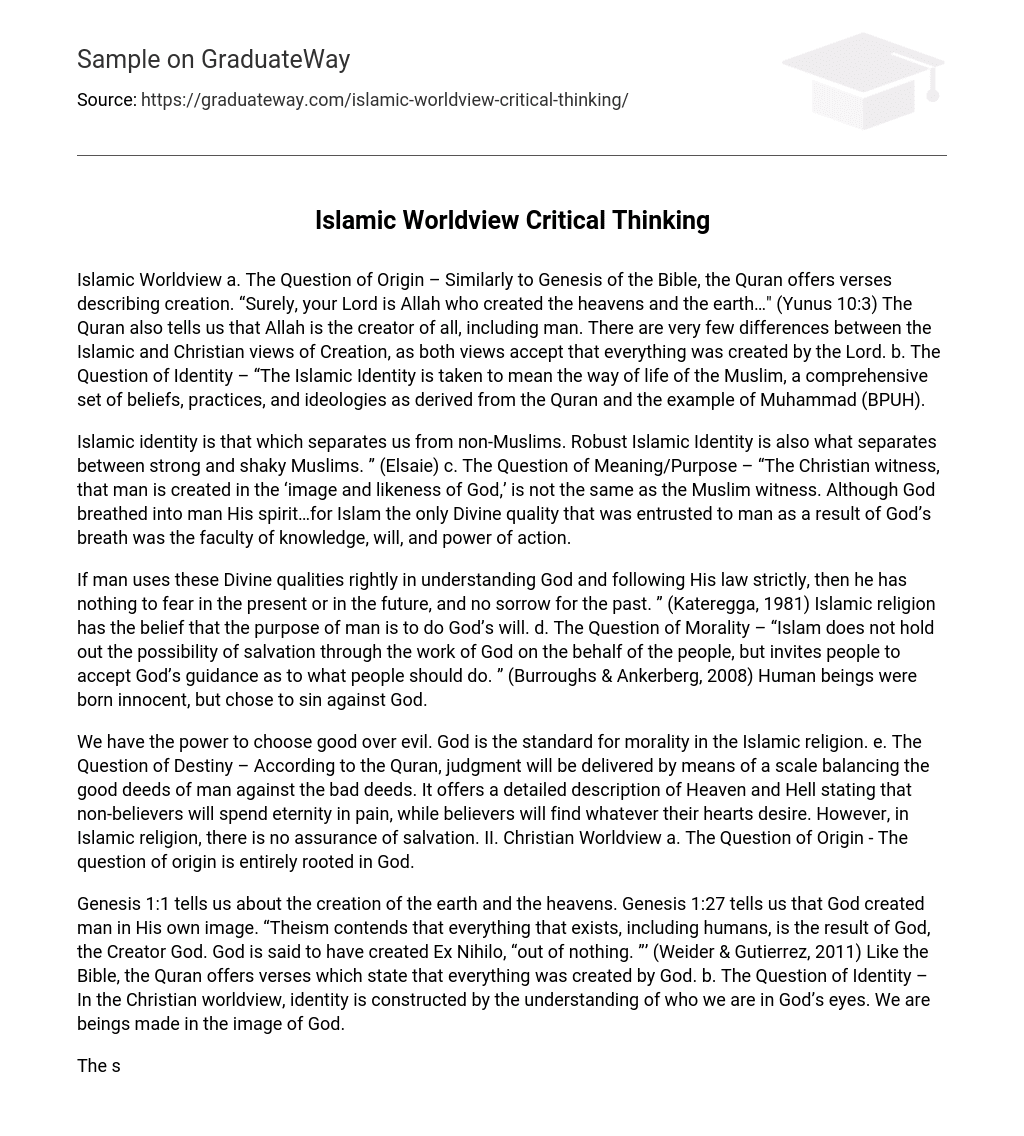Both the Islamic and Christian worldviews share similar beliefs about origin, as stated in the Quran and the Bible’s Genesis. Both affirm that Allah/God is the creator of everything, including the heavens and earth. The recognition of a divine creator is acknowledged by both Islam and Christianity.
In terms of identity, being a Muslim means following Islam as a way of life. This involves adopting various beliefs, practices, and ideologies derived from the teachings of Muhammad (peace be upon him) and the Quran.
Elsaie stresses the significance of a robust Islamic identity in distinguishing Muslims from non-Muslims and identifying individuals with a profound dedication to their faith. Christianity perceives humans as mirrors of God’s likeness, while Islam underscores the divine attributes bestowed upon humans through God’s breath – knowledge, determination, and capacity for action.
If man utilizes these Divine qualities correctly to understand and strictly follow God’s law, he will not fear the present or future, nor feel any sorrow for the past. ” (Kateregga, 1981)
The Islamic religion believes that man’s purpose is to carry out God’s will.
The Question of Morality – “Islam does not offer salvation through God’s work on behalf of people; instead, it encourages people to accept God’s guidance on what they should do.” (Burroughs & Ankerberg, 2008)
Although human beings are initially innocent, they decided to disobey God.
In Islam, individuals have the power to make choices between good and evil. The Quran describes God as the moral guide. The holy book discusses various subjects like destiny, judgment, and evaluating one’s actions. It also offers information about Heaven and Hell, where non-believers suffer everlasting punishment while believers receive their desires fulfilled. However, in Islam, salvation is not guaranteed. In contrast, Christianity directly links the issue of origin to God.
Both Genesis 1:1 and Genesis 1:27 address the creation of the earth, heavens, and humans. Theism holds the belief that God is the creator of everything, including humans. According to the Bible, this creation occurred out of nothingness. Likewise, the Quran also teaches that God is responsible for creating all things. From a Christian perspective, our identity is formed by our connection with God as we are crafted in His image.
In Genesis 1:26-27, it is stated that “Theism views God as eternal and that mankind is a special creation of God.” (Weider & Gutierrez, 2011)
The Islamic Identity is based on the lifestyle followed by Muslims.
Another consideration is the Question of Meaning/Purpose. According to theism, mankind’s purpose is to know God.
Christianity emphasizes having a relationship with God rather than solely adhering to religious rules and doctrines. John 17:3 sheds light on mankind’s purpose.
Similarly, Muslims believe their purpose is to fulfill God’s will.
The Question of Morality – Humanity was originally created as good, but sin entered the world through Adam as stated in Romans 5:12-14. Consequently, humans have fallen short of God’s glory (Romans 3:23), resulting in a natural inclination to disobey. Nevertheless, there remains a moral compass within us that distinguishes right from wrong. The ultimate standard is God Himself, who embodies holiness and is completely separate from evil. “Every human possesses this moral standard within their conscience, which Jesus Christ ultimately exemplifies. Therefore, Christians are called to adhere to God’s moral standard” (Lefebvre, 2011).
Both Christians and Muslims share the belief that God serves as the moral standard. They also recognize Heaven and Hell as separate realms where individuals experience either eternal blessings from God (Heaven) or punishment and separation from God (Hell). It is important to note, though, that Christians have faith in everlasting salvation through accepting Christ, while this conviction is not shared by Muslims.
Muslims hold a distinct belief compared to Christians. This information is derived from various sources such as books authored by Burroughs and Ankerberg (2008), Elsaie (n.d.), Kateregga (1981), Lefebvre (2011), the Quran (Yunus 10:3), and Weider and Gutierrez (2011).





